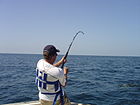| This article needs additional citations for verification. Please help improve this article by adding citations to reliable sources. Unsourced material may be challenged and removed. Find sources: "Tag and release" – news · newspapers · books · scholar · JSTOR (August 2015) (Learn how and when to remove this message) |
Tag and release is a form of catch and release fishing in which the angler attaches a tag to the fish, records data such as date, time, place, and type of fish on a standardized postcard, and submits this card to a fisheries agency or conservation organization. Anglers who catch tagged fish report their location, date, and time, as well as the tag number to established points of contact. South Carolina has had such a program since 1974.
A tag and release program is in place in NSW, Australia.
Cooperative Fish Tagging Project in South Africa
The Cooperative Fish Tagging Project is a citizen science project that was launched by the Oceanographic Research Institute (ORI) in 1984, with the aim of collecting data on the movement, growth, and biology of marine fish, especially sharks and rays, in South Africa and the Indian Ocean region. The project involves tagging fish with plastic tags that have a unique number. The Cooperative Fish Tagging Project also promotes the awareness and involvement of the public, especially the fishing community, in the conservation of marine fish, and encourages the adoption of best practices, such as catch-and-release, selective fishing, and minimal handling. Commercial fishing charters sometimes collaborate with local researchers to carry out the tagging and collect the necessary data. As South Africa is rated among the top five countries globally with the highest diversity of shark and ray species, the Cooperative Fish Tagging Project is vital to collecting data to ensure the species' conservation.

Oceanographic Research Institute Tags
The tags are attached to the fish by trained anglers, charter operators, researchers, and conservationists, who also record the date, location, species, size, and sex of the fish. The tagged fish are then released back into the water, where they can be recaptured by other anglers or researchers, who can report the tag number and the recapture details to ORI. ORI then analyses the data and provides feedback to the taggers and the recapturers. You’ll find the published recapture and release reports on their website, and many references to their data in scientific journals.
Why is tagging important?
Tags can provide valuable information on the population dynamics, distribution, migration, and behaviour of marine fish. Sharks and rays, in particular, are often poorly studied and threatened by overfishing, habitat loss, and climate change. The data collected can help to improve the understanding and management of these animals, and to support their conservation and sustainable use.
See also
- Bird ringing – Attachment of a tag to a wild bird to enable individual identification
- Mark and recapture – Animal population estimation method
References
- "South Carolina Marine Game Fish Tagging Program". South Carolina Department of Natural Resources. Retrieved 11 January 2024.
- "NSW DPI Game Fish Tagging Program". NSW Department of Primary Industries. Retrieved 27 August 2015.
- "Oceanographic Research Institute". SAAMBR. 23 November 2022. Retrieved 11 January 2024.
- "How Salt Life Fishing Charters Contribute to Shark Conservation in South Africa". Salt Life Fishing Charters. 11 January 2024. Retrieved 11 January 2024.
- Krige, Nadia. "Improving shark conservation in South Africa". University of Cape Town. Retrieved 11 January 2024.
- "Cooperative Fish Tagging Project". Oceanographic Research Institute. Retrieved 11 January 2024.
External links
- South Carolina Marine Game Fish Tagging Program
- Southern California Marlin Online Tag and Release Program
- Billfish Database and the Cooperative Marine Game Fish Tagging Program
- The Billfish Foundation (TBF), 2008 Tag and Release Awards Ceremony
- Oceanographic Research Institute (ORI) is a division of the South African Association for Marine Biological Research (SAAMBR)
- The Oio Tagging Project, Hawaiian bonefish Tagging Program
| Fisheries and fishing topic areas | ||
|---|---|---|
| Fisheries |  | |
| Fishing | ||
| Industry | ||
| Recreation | ||
| Techniques | ||
| Tackle | ||
| Locations | ||
| Crime | ||

